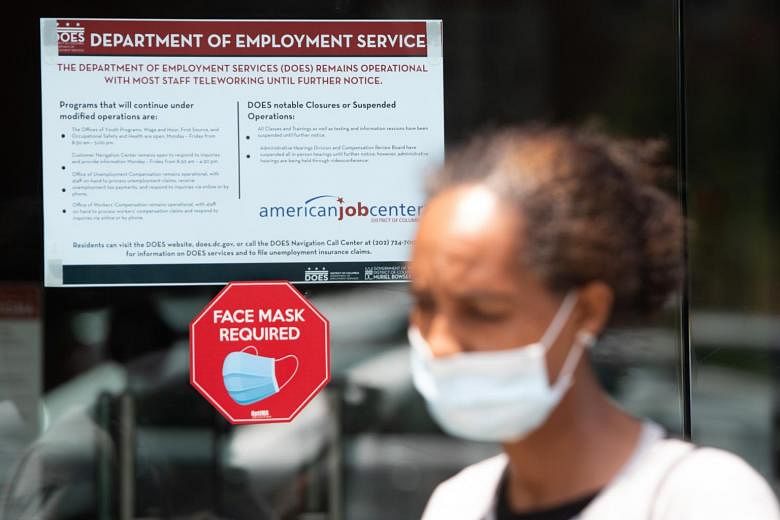WASHINNGTON (NYTIMES) - State unemployment claims increased last week for the first time in nearly four months, disturbing evidence that the struggling US economy is backsliding at a time when coronavirus cases are on the rise.
After a flood of claims as the pandemic shut businesses early in the spring, weekly unemployment filings fell sharply before flattening in June. But on Thursday (July 23), the Labor Department reported more than 1.4 million new applications for state benefits last week, up from about 1.3 million in the preceding two weeks.
Another 975,000 jobless workers filed for benefits through an emergency federal programme, also an increase. Unlike the figure for state claims, that number is not seasonally adjusted.
Claims are rising just as a US$600-a-week federal supplement to jobless benefits is set to expire and Republican infighting has kept the party from putting forward a proposal for further aid, much less negotiating with Democrats on a bill.
The discouraging news from the Labor Department followed a Census Bureau survey showing that 4 million fewer people were employed last week than the week before. It was the fourth straight decline, suggesting that nearly all the job gains since mid-May had been erased.
"At this stage, you're seeing all the wrong elements for recovery," said Gregory Daco, the chief US economist at Oxford Economics. "A deteriorating health situation, a weakening labor market and a softening path for demand."
Mr Daco said the rush to reopen in many states had been counterproductive, contributing to the increasing virus caseloads, particularly in the South and West, that are compelling businesses to close again.
"Increasingly I fear that we're going to see net payrolls in July will show an actual decline" when the next monthly jobs report is released, he added.
About 30 million people - roughly 1 in 5 American workers - are drawing jobless benefits. Without congressional action to extend the weekly federal supplement, the unemployed will be left with less money to pay for food, medical care, rent and other bills. Also nearing an end is the federal Paycheck Protection Program, which provided small businesses with emergency loans that spared many workers from layoffs.
The stubbornly high rate of new unemployment claims "suggests that the nature of the downturn has changed from early on," said Ernie Tedeschi, a policy economist at equity research firm Evercore ISI. In addition to reflecting renewed shutdowns, he said, the setbacks on the job front may indicate something more fundamental.
"It might be that businesses are running through their first line of credit," he said, "and now they're facing the music of an economy that has recovered a little bit but not nearly enough."
In that case, temporary business closings and layoffs would increasingly turn into permanent ones.
On Thursday, the owner of Ann Taylor and Lane Bryant became the latest of a string of large retailers to file for bankruptcy. It announced that 1,600 of its 2,800 stores around the country would be shut.
Wieden+Kennedy, an ad agency that has worked with clients like McDonald's, Ford and Procter & Gamble, said this week that it had laid off 11 per cent of its workforce after paring expenses and cutting executives' pay.
And while the overall jobless rate dipped in June to 11.1 per cent from a peak of 14.7 per cent in April, troubling weaknesses are growing more prominent.
"The increased joblessness will certainly hinder the economic recovery, especially if the Congress fails to extend the supplemental benefits that were part of the CARES Act," said Carl Tannenbaum, chief economist at Northern Trust.
Passed at the end of the March, the legislation created a temporary federal jobless programme, Pandemic Unemployment Assistance, to cover freelancers, part-time workers and others who do not qualify for regular state jobless aid. It extended jobless benefits for an extra 13 weeks for state recipients who exhausted their aid allotment. And it helped jobless workers survive the cash crunch by approving a weekly $600 benefit - a supplement that essentially expires Saturday.
That extra money "provided critical support over the last several months," said Rubeela Farooqi, chief US economist at High Frequency Economics. Such support - even at a reduced level - "is going to be increasingly important going forward," she said.

